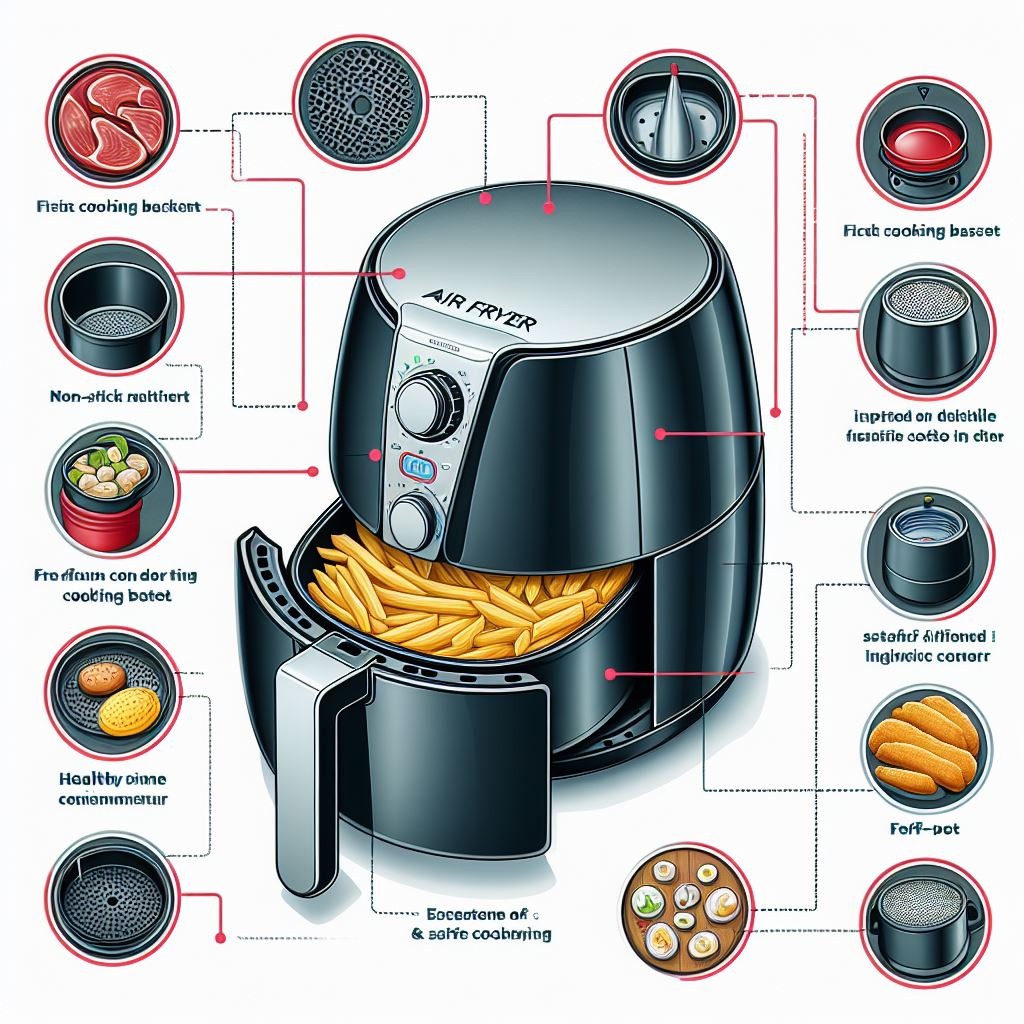Air fryers have taken the world by storm in recent years, promising a healthier alternative to deep frying without sacrificing flavor. But as more and more people jump on the air fryer bandwagon, concerns have been raised about the safety of these appliances. One particular concern is whether or not air fryers are coated with Teflon, a popular non-stick material that has been associated with health risks.
Teflon is widely used in various kitchen appliances due to its non-stick properties. However, it has come under scrutiny over the years due to the potential release of toxic fumes when exposed to high temperatures. This has led many consumers to question whether their beloved air fryers are coated with this potentially harmful material. After all, the whole point of using an air fryer is to cook food at high temperatures for that crispy texture – so it’s understandable why people might be worried.
The good news is that not all air fryers are coated with Teflon. Many manufacturers offer alternatives such as ceramic or stainless steel coatings that provide a safer cooking experience. These options not only reduce the risk of exposure to harmful chemicals but also offer excellent non-stick capabilities.
So if you’re concerned about potential health risks associated with Teflon coatings, rest assured that there are other options available on the market.
Understanding Air Fryer Coatings
Teflon (PTFE):
Teflon, short for polytetrafluoroethylene, is a synthetic fluoropolymer that has been widely used in non-stick cookware for decades. It is known for its exceptional non-stick properties and heat resistance. While Teflon has been used in various kitchen appliances, such as frying pans and griddles, its use in air fryers is relatively limited.
Ceramic:
Many air fryers use a ceramic coating as an alternative to Teflon. Ceramic coatings are favored for being PTFE and PFOA-free, making them a healthier choice for those concerned about potential health risks associated with Teflon. Ceramic coatings are known for their durability and non-stick properties, allowing for easy cleaning and food release.
Stainless Steel:
Some high-end air fryers feature stainless steel cooking baskets or trays. While stainless steel is not a non-stick material, it is known for its durability and resistance to corrosion. Stainless steel surfaces may require a bit more oil or cooking spray to prevent sticking, but they are generally considered a safe and healthy choice.
Non-Stick Coatings:
Apart from Teflon and ceramic coatings, some air fryers may use proprietary non-stick coatings. These coatings may vary in terms of composition and quality, so it’s essential to refer to the manufacturer’s specifications to understand the materials used.
Teflon in Air Fryers: A Rare Occurrence
As mentioned earlier, Teflon is not commonly used as a non-stick coating in air fryers. Manufacturers have recognized the demand for healthier alternatives, which has led to the widespread adoption of ceramic coatings and stainless steel surfaces. These materials offer non-stick properties without the potential health concerns associated with Teflon.
While Teflon was once a common choice for non-stick coatings in kitchen appliances, its use in modern air fryers is indeed rare. This shift away from Teflon can be attributed to several factors:
- Health Concerns:
Teflon-coated cookware has faced scrutiny due to the release of potentially harmful fumes, including perfluorooctanoic acid (PFOA) when exposed to high temperatures. PFOA has been associated with health risks, including cancer. However, Teflon-coated cookware manufactured after 2013 is generally considered safe because it no longer contains PFOA.
- Consumer Demand:
Health-conscious consumers have driven the demand for healthier alternatives. Manufacturers have responded by opting for ceramic coatings, stainless steel, or proprietary non-stick coatings that are perceived as safer options.
- Regulatory Changes:
Stringent regulations and increased awareness of the potential health risks associated with Teflon have encouraged manufacturers to explore alternative non-stick coatings.
Conclusion
Teflon is not a common non-stick coating used in air fryers. Manufacturers have shifted towards healthier alternatives like ceramic coatings and stainless steel, which offer similar non-stick properties without the associated health concerns.
When choosing an air fryer, it’s essential to check the manufacturer’s specifications to ensure you are aware of the type of non-stick coating used.
Ultimately, with proper care and maintenance, air fryers can provide a convenient and healthier way to enjoy crispy and delicious meals without the need for excessive oil or Teflon.
FAQs
1. Are all air fryers coated with Teflon?
No, not all air fryers are coated with Teflon. Teflon coatings are relatively rare in modern air fryers. Manufacturers have shifted towards using safer alternatives like ceramic coatings, stainless steel, or proprietary non-stick coatings.
2. What are the alternatives to Teflon in air fryers?
The most common alternatives to Teflon in air fryers include ceramic coatings, stainless steel cooking surfaces, and proprietary non-stick coatings. These options provide non-stick properties without the potential health concerns associated with Teflon.
3. Is Teflon safe to use in air fryers?
Teflon-coated cookware manufactured after 2013 is generally considered safe for use, as it no longer contains perfluorooctanoic acid (PFOA), a substance associated with health risks. However, Teflon can emit potentially harmful fumes if overheated, so proper usage and temperature control are essential.
4. Are ceramic-coated air fryers a healthier option?
Ceramic-coated air fryers are often considered a healthier choice because they are free from PTFE and PFOA. These coatings are known for their durability, excellent non-stick properties, and ease of cleaning.
5. Do stainless steel air fryers work as well as non-stick models?
Stainless steel air fryers may require a bit more oil or cooking spray to prevent sticking compared to non-stick models. However, with proper use and maintenance, they can still produce excellent cooking results and are considered a safe and durable option.




